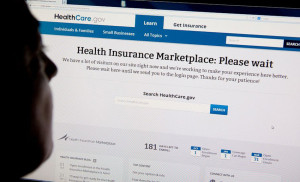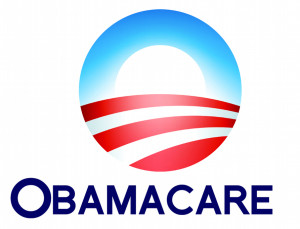Obamacare launch hits early hitch as online traffic snarls up sites
Daily News Article — Posted on October 2, 2013

A woman looks at the HealthCare.gov insurance exchange website in Washington, Oct. 1, 2013. (Karen Bleier/AFP/Getty Images)
(by David Morgan and Caroline Humer, Reuters) – The U.S. government launched the centerpiece of President Barack Obama’s landmark healthcare reform on Tuesday, opening new insurance marketplaces across the country for millions of uninsured Americans, but technical glitches prevented access to many of their websites.
The opening of the state marketplaces, also called exchanges, went ahead despite a partial federal government shutdown precipitated by Republican opposition to the healthcare law that deadlocked a spending bill in Congress.
But a federally-run exchange for consumers in 36 states began posting error messages for at least 24 of them soon after the system opened for enrollment at 8 a.m. EDT, citing online traffic as a reason for the difficulties. An administration official said experts were aware of the issue and were working on it.
“Consumers who need help can also contact the call center, use the live chat function or go to localhelp.healthcare.gov to find an in-person assistor in their community,” the U.S. Department of Health and Human Services said in a statement.
Exchanges run by 14 states and the District of Columbia presented a mixed picture. Some, like Massachusetts, [which has had its own mandatory state-run health insurance exchange since 2006] were able to accept consumer log-ins. The state-run exchange in Maryland delayed its opening by four hours, while Minnesota said it would wait until the afternoon after checking its connection with federal databases.
The websites will give many Americans their first glimpse of new subsidized health plans that are being offered to millions of the uninsured, in the most costly U.S. social program since Medicare was introduced in the 1960s.
Administration officials said they had expected a rocky opening because of the challenge of building a massive technological infrastructure within a short time.
 President Obama was scheduled to promote his signature domestic policy achievement on Tuesday, including a meeting in the Oval Office with a group of Americans who stand to benefit from the program, while Vice President Joe Biden and first lady Michelle Obama will also promote the law in the media.
President Obama was scheduled to promote his signature domestic policy achievement on Tuesday, including a meeting in the Oval Office with a group of Americans who stand to benefit from the program, while Vice President Joe Biden and first lady Michelle Obama will also promote the law in the media.
The marketplaces, or exchanges, require health plans to provide a broad range of essential benefits that were not necessarily part of individual policies in the past, including mental health services, birth control, abortions and preventive care. …
The Affordable Care Act, commonly known as Obamacare, also mandates that Americans obtain insurance or pay a fine. …
Republicans have fought for months to delay or stop Obamacare, most recently triggering a shutdown of the federal government on Monday night by insisting that a routine funding measure include a delay in Obamacare, which the Democratic-controlled Senate rejected.
“The Affordable Care Act [Obamacare] is moving forward. That funding is already in place. You can’t shut it down,” Obama told his Republican opponents in a televised statement at the White House on Monday.
(Additional reporting by Lewis Krauskopf and Sharon Begley in New York; Editing by Mohammad Zargham, Michele Gersberg and Grant McCool)
Reprinted here for educational purposes only. May not be reproduced on other websites without permission from Thomson Reuters. Visit the website at Reuters.com.
Questions
PC World explains the federal government's health exchange data hub as a huge IT system that will process uninsured U.S. residents’ applications for health insurance
Obamacare "health exchanges" (also referred to as state exchanges or insurance exchanges) have also been explained as:
- a government-regulated marketplace of insurance plans with different tiers, or levels of coverage, offered to individuals without health care or to small companies. (from theatlantic.com/business/archive/2009/09/what-is-the-health-insurance-exchange/26748)
- a set of government-regulated and standardized health care plans from which individuals who are not provided with health insurance through their employer may purchase health insurance eligible for federal subsidies. All exchanges must be fully certified and operational by January 1, 2014, under federal law. (from wikipedia)
1. What are the healthcare exchanges?
2. a) In how many states will the federal government run the exchange?
b) How many state governments have opted to run their own exchanges?
3. a) The healthcare exchanges opened Tuesday, October 1st. In how many of the states with federally-run exchanges were applicants unable to sign-up?
b) Why were they unable to sign-up?
4. People who don't have health insurance, and don't sign up for it through the government exchanges, will be fined by the government. [see below for the rates]
ALL are required by law to sign up for medical insurance by January 1, 2014 if they don't already have it.
How can people who can't access the government exchanges get help signing up so they avoid the fine they'll be charged for not having insurance?
5. Read the information under "Background" below the questions. What are the reasons for the flaws in the insurance exchange hub and portal? List 4.
Background
Obamacare - Penalty Rates (to be collected by the IRS)
- In 2014, the penalty will be the greater of 1% of taxable income or $95 per adult (whichever is higher) and $47.50 per child. [It appears that the family will only be charged for the first 4 children.]
- In 2015, the penalty will be the greater of 2% of taxable income or $325 per adult (whichever is higher) and $162.50 per child.
- In 2016, the penalty will be the greater of 2.5% of taxable income or $695 per adult (whichever is higher) and $347.50 per child.
- After 2016, the penalty will be increased annually by the increase to the cost-of-living.
It's important to remember that someone who pays the penalty won't get any health insurance coverage. They still will be responsible for 100% of the cost of their medical care. After open enrollment ends on March 31, 2014, they won't be able to get health coverage through the government Marketplace until the next annual enrollment period, unless they have a qualifying life event.
ObamaCare's Technology Mess - At least a half dozen state exchanges won't offer full online enrollment thanks to unresolved software problems. (from wsj.com)
President Obama is bracing Americans for inevitable problems as the Affordable Care Act rolls out this week, but what he calls "glitches" are hardly routine. Information technology is ObamaCare's Achilles' heel. The faulty IT will expose Americans to lost data, attempts to enroll online that fail and the risk of fraud.
There are two key technological flaws in ObamaCare. First is the "hub" - the software to link servers at the Treasury Department, the Internal Revenue Service, Homeland Security and state agencies to verify the income and health-insurance status of enrollees and ensure that they are eligible for subsidies. The other flaw is the "portal" - the federally run IT platform that is supposed to let consumers compare health plans and select one that best suits their needs.
In planning ObamaCare's IT infrastructure, the Centers for Medicare and Medicaid Services (CMS) dawdled for more than a year under Administrator Donald Berwick until Marilyn Tavenner took over in December 2011. Even then the agency was slow to outsource key contracts and turned to what insiders say were not top-quality programmers. CMS did not sign a contract for a backstop system to process paper verifications and do paper verifications of online applications until July.
The Health and Human Services Department did not begin testing the chief pieces of this IT system until August. The testing found that states couldn't consistently link to the federal portal (a problem that persists in some states), and that the hub couldn't reliably verify if a person is eligible for a subsidy, or accurately calculate how much the applicant is eligible to receive. HHS prevented independent watchdogs, including its own inspector general, from examining the systems before they [went] live on Oct. 1. The result is a host of troublesome gaps and dangers.
The biggest risk involves data security. The Obama administration created unnecessary opportunities for fraud with the White House's pork-minded insistence on funding favored community groups to employ "navigators" to solicit applicants and help them input their personal information, such as income and Social Security numbers. The navigators were hastily hired and trained (they are still being hired) and were not given extensive background checks. The personal data for millions of people will be entrusted to these navigators—and to a computerized system that has been rushed into operation.
Another technological hurdle involves health-insurance subsidies. At least a half-dozen states, including Colorado and Oregon, have said that they won't offer full online enrollment through their exchanges because the federal hub that is supposed to link to help them determine the subsidies people are eligible for isn't working properly. A link to Medicaid agencies also isn't functioning. This link is necessary to ensure that someone applying for a subsidy under a health plan is not Medicaid-eligible under his state's rules.
If the hub can't verify this, the individual will get booted from the ObamaCare enrollment system and shifted to a call center for confirmation by an ObamaCare agent who is likely to be fielding a deluge of complaints. Some people will end up getting subsidies they weren't qualified for. Washington eventually will have to try to claw back the money. This will create a massive pay-and-chase challenge as people move in and out of the exchanges and get subsidies that many of them won't even know they didn't deserve.
The subsidies will likely present other woes. For example, separate cost-sharing subsidies intended to reduce a person's out-of pocket costs are subject to the budget sequester. As a result, some of the reductions in co-insurance won't materialize. Patients won't know what they will owe for doctor visits, prescriptions or hospital stays. The Obama administration hasn't begun to address the issue.
As for medical care, the current ObamaCare software doesn't even try to take a serious stab at letting consumers match the health plans on the exchanges with their particular medical needs, or with their providers, at the point of enrollment. In some cases - but not necessarily all - they can click through to the plans to ferret out the information they need.
On Friday, HHS finally awarded a $380 million, four-year contract to manage appeals from consumers fighting for benefits that the insurance plans have denied. If it was hard to appeal medical claims through your current insurance plan, wait until you have to call a remote federal contractor.
The technology and privacy problems presented by ObamaCare aren't likely to be mere rough patches that can be easily smoothed over. The provision of health care is an inherently local endeavor, and it increasingly appears that so is applying for health insurance. ObamaCare is an attempt to federalize the entire system, but the IT backbone appears unable to support this political ambition.
In September, the Minnesota state health-insurance exchange inadvertently disclosed several thousand Social Security numbers before the exchange even opened for business. Once the entire, gargantuan system is fired up nationwide, data leaks are almost a certainty.
That's the thing about technology: Glitches happen. Usually they're annoyances. Now, more than ever, they're going to involve the government and your health.
Dr. Gottlieb is a physician and resident fellow at the American Enterprise Institute. He is the Republican appointee on the HHS Federal Health IT Policy Committee that works on electronic health record guidelines for doctors' offices but has nothing to do with the rollout of the ObamaCare exchanges. Mr. Astrue was the Commissioner of Social Security until earlier this year.
